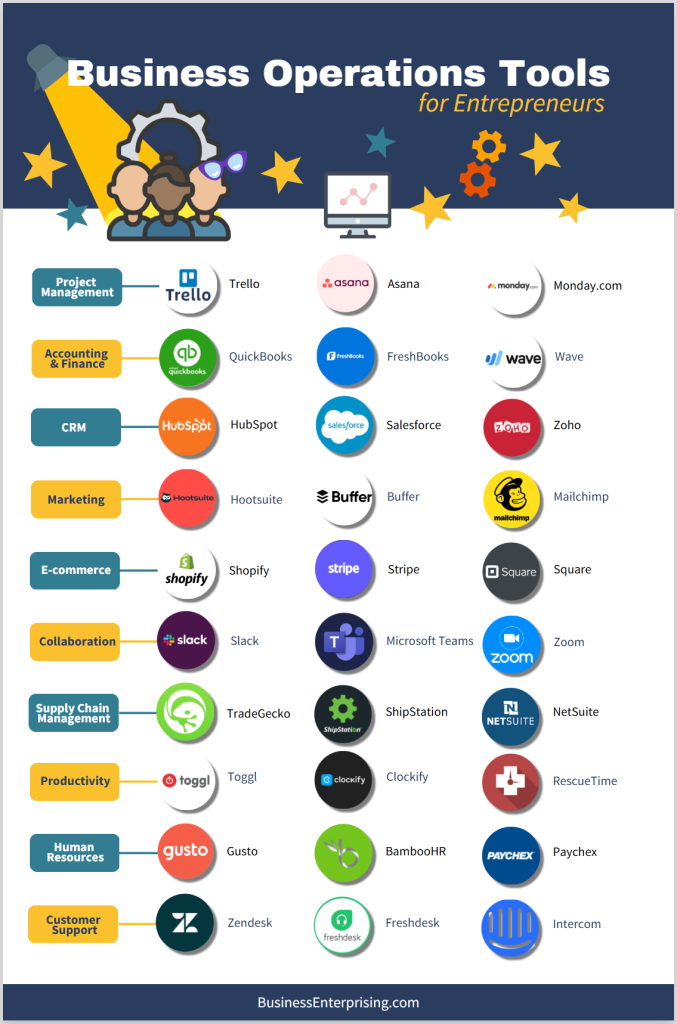 Running a business requires efficient tools to manage daily operations, improve productivity, and support growth. The right software can help you streamline tasks, automate processes, and enhance collaboration. However, with so many options available, choosing the best tools for your business can feel overwhelming. Evaluating features, integrations, and ease of use can help you make informed decisions. Additionally, business operations tools for entrepreneurs simplify everything from financial management to customer relationships.
Running a business requires efficient tools to manage daily operations, improve productivity, and support growth. The right software can help you streamline tasks, automate processes, and enhance collaboration. However, with so many options available, choosing the best tools for your business can feel overwhelming. Evaluating features, integrations, and ease of use can help you make informed decisions. Additionally, business operations tools for entrepreneurs simplify everything from financial management to customer relationships.
These tools allow you to focus on strategic planning instead of getting lost in administrative tasks. Whether you need software for accounting, marketing, or project management, selecting the right solutions can improve efficiency. However, adopting the wrong tools can slow down progress and create unnecessary complications.
Technology continues to change how businesses operate. Automating repetitive tasks saves time and reduces human error, allowing you to focus on scaling your business. Additionally, investing in reliable software improves team collaboration and enhances the customer experience. Choosing the best business tools positions your company for long-term success while keeping operations organized and efficient.
Project Management Software to Streamline Workflow
Effective project management software can help you stay organized, improve collaboration, and meet deadlines with ease. Tools like Trello, Asana, and Monday.com provide user-friendly platforms that simplify task management. These solutions allow you to create project boards, assign tasks, and track progress in real time. Additionally, they help teams stay aligned, reducing the risk of missed deadlines or miscommunication.
Managing multiple projects can become overwhelming without a clear system in place. However, project management tools give you visibility into ongoing tasks and deadlines. Asana, for example, offers detailed project timelines and automation features that improve efficiency. Trello’s visual boards make it easy to organize tasks and prioritize work. Additionally, Monday.com provides customizable workflows that adapt to your specific business needs.
Collaboration becomes easier when your team has a shared platform for communication and task tracking. These tools allow you to assign responsibilities, set due dates, and share files in one place. Additionally, they integrate with other business applications, reducing the need for constant email updates. This makes them essential business operations tools for entrepreneurs looking to improve productivity and organization.
Investing in the right project management software can help you scale operations while maintaining control over daily tasks. By streamlining workflow and improving team coordination, these tools save time and increase efficiency. Selecting a platform that matches your workflow can improve overall business performance and keep projects on track. Adopting the right tools today can set your business up for long-term success.
Accounting and Finance Tools for Managing Cash Flow
Managing cash flow is essential for keeping your business stable and growing. Accounting and finance tools help you track expenses, create invoices, and manage budgets efficiently. Platforms like QuickBooks, FreshBooks, and Wave offer automated features that simplify financial tasks and reduce manual work. Additionally, these tools provide real-time insights into your cash flow, helping you make informed decisions.
QuickBooks is a popular choice for businesses that need detailed financial tracking. It allows you to manage invoices, monitor expenses, and generate financial reports. Additionally, it integrates with banking systems, making it easy to track transactions. FreshBooks, on the other hand, is ideal if you need a user-friendly interface with strong invoicing features. It simplifies recurring payments and allows clients to pay directly through the platform.
Wave offers free accounting solutions tailored to small businesses. It provides invoicing, expense tracking, and receipt scanning without the cost of premium software. Additionally, Wave’s features help freelancers and small business owners manage finances without hiring an accountant. However, choosing the right platform depends on the complexity of your financial needs and the size of your business.
Keeping your finances organized is key to long-term success. Business operations tools for entrepreneurs, such as accounting software, save time and improve financial accuracy. Additionally, they help you maintain a clear picture of your cash flow, preventing unexpected shortfalls. Investing in the right tool allows you to focus on growing your business while keeping financial management simple and efficient.
Customer Relationship Management (CRM) Software to Improve Sales
Managing customer relationships effectively can improve sales and strengthen long-term business growth. CRM software helps you track interactions, automate follow-ups, and build stronger connections with clients. Platforms like HubSpot, Salesforce, and Zoho CRM allow you to manage leads, streamline communication, and analyze customer behavior. Additionally, these tools provide insights that help you tailor your marketing efforts and increase conversions.
HubSpot offers a user-friendly CRM with features that support email marketing, sales tracking, and customer service. It helps you organize contacts, manage pipelines, and automate tasks. Additionally, its integration with other tools makes it easy to connect different aspects of your business. Salesforce provides advanced CRM solutions designed for businesses that need deep analytics and automation. However, its flexibility allows you to customize workflows based on your specific needs.
Zoho CRM is a cost-effective option for small businesses looking for automation and customer insights. It includes lead tracking, email integration, and AI-powered recommendations. Additionally, it helps you monitor customer interactions across multiple channels. Choosing the right CRM depends on the size of your business, the complexity of your sales process, and your automation needs.
Investing in CRM software allows you to manage relationships more efficiently. Business operations tools for entrepreneurs, such as CRMs, improve sales by keeping customer data organized and accessible. Additionally, they help you track leads, personalize communication, and increase customer retention. Using a CRM system ensures that no opportunity is overlooked, helping you build long-term success.
Marketing and Social Media Automation Platforms
Managing marketing efforts effectively can save time and increase engagement. Social media and email automation platforms help you streamline campaigns and stay connected with your audience. Tools like Hootsuite, Buffer, and Mailchimp allow you to schedule posts, send automated emails, and track performance. Additionally, automation reduces manual effort, helping you focus on strategy and growth.
Hootsuite provides a centralized dashboard where you can manage multiple social media accounts. It allows you to schedule posts, track analytics, and engage with followers. Additionally, it offers automated content suggestions based on trends. Buffer is another platform that simplifies social media management by organizing posts in a queue. However, its strength lies in its user-friendly interface and detailed post-performance insights.
Mailchimp focuses on email marketing automation, making it easy to create and send campaigns. It helps you segment your audience, personalize messages, and analyze open rates. Additionally, its automation features allow you to schedule follow-ups and nurture leads. Choosing the right tool depends on your marketing needs and the platforms you use most frequently.
Investing in automation tools can improve consistency and audience engagement. Business operations tools for entrepreneurs, such as Hootsuite and Mailchimp, help create a structured marketing workflow. Additionally, automation ensures that your content reaches the right audience at the right time. Using these tools allows you to grow your business while maintaining an efficient marketing strategy.
E-commerce and Payment Processing Solutions
Selling online requires reliable e-commerce and payment processing solutions to create a seamless customer experience. Platforms like Shopify, Stripe, and Square simplify online transactions and help you manage sales efficiently. These tools allow you to accept payments securely while integrating with your website and other business systems. Additionally, they offer features that enhance customer trust and improve checkout speed.
Shopify provides an all-in-one solution for building and managing an online store. It includes customizable website templates, inventory management, and multiple payment options. Additionally, it integrates with social media and third-party marketplaces, expanding your sales channels. Stripe, on the other hand, focuses on payment processing with flexible options for online businesses. However, its advanced customization features require some technical knowledge to set up effectively.
Square is ideal for businesses that sell both online and in person. It offers easy-to-use point-of-sale systems, invoicing tools, and mobile payment options. Additionally, Square’s built-in analytics provide insights into customer spending habits. Choosing the right platform depends on your business size, sales model, and payment preferences. However, all three solutions help streamline transactions and enhance the customer experience.
Reliable payment processing tools improve cash flow and boost customer confidence. Business operations tools for entrepreneurs, such as Shopify and Stripe, make online sales easier to manage. Additionally, secure transactions help prevent fraud and reduce abandoned carts. Investing in the right e-commerce platform allows you to scale your business while maintaining a smooth purchasing process.
Collaboration and Communication Tools for Remote Teams
Managing remote teams effectively requires reliable communication and collaboration tools. Platforms like Slack, Microsoft Teams, and Zoom help businesses maintain seamless interaction across different locations. These tools allow you to streamline communication, improve productivity, and reduce delays in project execution. Additionally, they provide features that keep your team connected and aligned on goals.
Slack offers a simple way to organize conversations through channels, direct messages, and integrations with other work applications. It helps reduce email clutter while keeping communication organized. Additionally, its real-time messaging and notification settings allow teams to stay responsive without constant distractions. Microsoft Teams provides a more structured platform for collaboration, integrating chat, video meetings, and file sharing. However, it works best for businesses already using Microsoft’s suite of tools.
Zoom remains a go-to option for virtual meetings, offering high-quality video conferencing and screen-sharing capabilities. It supports webinars, team discussions, and one-on-one check-ins. Additionally, it integrates with various business applications, making it a versatile tool for remote teams. Choosing the right platform depends on your team’s size, workflow, and collaboration needs. However, combining multiple tools can create a more efficient communication system.
Using the right collaboration tools helps maintain productivity and teamwork in remote settings. Business operations tools for entrepreneurs, such as Slack and Zoom, create a connected work environment. Additionally, clear communication reduces misunderstandings and enhances efficiency. Investing in reliable communication platforms allows your team to work smoothly, regardless of location.
Conclusion
Choosing the right business tools can help you streamline operations, improve efficiency, and support growth. The right software solutions simplify financial management, customer relationships, and team collaboration. Additionally, automation reduces manual tasks, allowing you to focus on strategic goals. Investing in reliable platforms improves productivity and enhances your ability to scale.
Technology plays a major role in how businesses operate. However, selecting the best tools depends on your industry, budget, and specific needs. Whether you need project management software, marketing automation, or payment processing, evaluating features and integrations is essential. Additionally, testing different platforms can help you determine which solutions align with your workflow.
Using business operations tools for entrepreneurs allows you to manage daily tasks more effectively. Additionally, these tools improve customer engagement and create a seamless experience for your team. Keeping up with advancements in business technology helps you stay competitive and adaptable. The right tools empower you to run your business efficiently while preparing for future growth.



